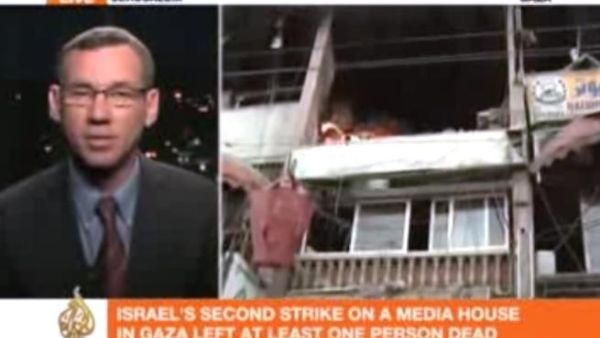In the early hours of Sunday morning, Israeli strikes hit the Al-Shawa building in Gaza. A few hours later, the al-Shuruq building was also targeted.
These were just a few incidental hits in a broader escalation of violence that has left more than 100 Palestinians dead and countless wounded. But the buildings targeted were media centers and among the injured were six journalists.
Mark Regev, spokesman for the Israeli government, talked to AlJazeera on Monday to clarify: “We don’t target journalists, we target Hamas”, he said.
According to Israeli intelligence, Hamas was using the Al-Shawa building as a base and had “antennas” stationed on the roof. However, both Ma’an News and Al-Quds TV offices were also located on the floor below.
In a heated interview with the Qatar-based TV network, Regev said the Al-Aqsa station, also situated in the targeted building, was simply a “Hamas command and control facility”.
He went on to suggest that the fact that those injured were not “foreign journalists” meant the attack had not in fact impacted “journalists” at all.
His comments once again highlighted the difference between foreign correspondents and their local staff. The BBC recently faced down criticism for their coverage of the Gaza conflict after their local cameraman’s son was killed by one of the Israeli bombs.
The British broadcaster was slow to correct headlines about “militants” killed in Gaza and many believed their response would have been different if one of their international staff had been affected.
During the 2009 war, AlJazeera correspondents, Ayman Mohyeldin and Sherine Tadros were the only international reporters to stay throughout the conflict. Israeli permission to enter the besieged Strip was near impossible to come by for anyone else.
So far Israel has taken a different tack this time and allowed “foreign” journalists in to cover the news. Despite their attempts to block reports in 2009, the power of social networking showed that there is no such thing as a “media blackout” anymore.
But local reporters still play a key role in getting news out to the outside world and Regev’s attempts to undermine their job caused outrage among netizens on Tuesday.
The Israeli spokesman tried to calm the waters by claiming that in Israel “we see all journalists as legitimate people”, adding that he was a supporter of free press. But, as his AlJazeera interviewer pointed out, in order to have a free press you cannot target journalists in strikes, even if you believe they are spreading ideas contrary to your own.
Do you think the targets were legitimate? Are Hamas using journalists as human shields or is Israel targeting the media? Tell us your thoughts below.







